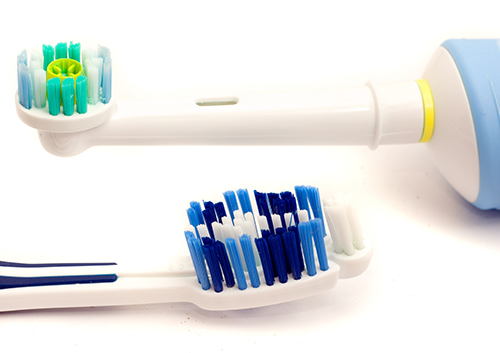December 14th, 2016

It's a habit many people have and not only can it be annoying to the people around you, it can be detrimental to your dental health. Chewing ice is so common that it even has its own name, pagophagia. We're not talking about a slushy or shaved ice (although those artificially sugary treats should be avoided too!) but more like the hunks of ice rattling around in the bottom of your glass.
Ice chewing can be a sign of emotional problems like stress or obsessive-compulsive disorder, but it can also be a marker for iron deficiency anemia and other physical problems. Then again, some people just like to have something to chew on. For whatever reason you find yourself chewing on it, it's a habit you need to break.
Chewing on ice can cause:
- Chipped and cracked teeth
- Damaged enamel
- Sore jaw muscles
- Damage to dental work such as crowns, fillings, or other appliances
If chewing on ice is becoming a problem in your life, don’t hesitate to speak with Dr. Gregory Weaver about it. But if you find yourself still wanting to chew on something, here are a few alternatives to ice:
- Baby carrots
- Celery sticks
- Sugar-free (xylitol) gum
We know you need to chill sometimes, but chomping down your entire glass of ice is not the way to do it. If you have any other questions on the topic, feel free to talk with a member of our Raleigh, NC team. It may be beneficial in solving the issue and helping to remediate any damage to your teeth.
December 7th, 2016

You live in the golden age of toothbrushes. Until a few decades people used twigs or brushes made from animal hair to clean their teeth: not very soft and none too effective.
Now, you have a choice of manual brushes with soft, medium, or hard bristles. Or you might choose to go with an electric toothbrush instead.
Have you ever wondered whether manual or electric brushes provide better cleaning? Actually, they both do the job. The key is to brush and floss every day, regardless of the kind of brush you prefer.
At our Raleigh, NC office, we like to say the best brush is the one you'll use. So if you prefer manual, go for it. If you prefer electric, turn it on.
Both types have their advantages but both types will get the job done as far as removing plaque.
Electric Toothbrushes
- Provide power rotation that helps loosen plaque
- Are great for people with limited dexterity due to arthritis or other problems
- Are popular with kids who think the electric brushes are more fun to use
- Can come with variable speeds to help reduce pressure on sensitive teeth and gums
Manual Toothbrushes
- Can help brushers feel they have more control over the brushing process
- Allow brushers to respond to twinges and reduce the pressure applied to sensitive teeth and gums
- Are more convenient for packing when traveling
- Manual brushes are cheaper and easier to replace than the electric versions.
In many ways, the golden age is just beginning. There are already phone apps available to remind you to brush and floss. New apps can play two minutes worth of music while you brush, help you compare the brightness of your smile or help explain dental procedures. Maybe someday we’ll even have programs that examine your teeth after brushing and identify spots you might have missed.
November 30th, 2016

Inflamed gums are a fairly common dental issue, but unfortunately, many people don't take the problem seriously enough. If you ignore inflamed gums and continue your usual routine, you could be encouraging a much more severe inflammation problem, and the pain that goes along with that. Fortunately, it is quite easy to relieve inflamed gums if you use the tips below.
Use Soft Bristles
A soft-bristle toothbrush - the softest you can buy - is a must for anyone with inflamed gums. Anything that makes contact with your gums can cause you pain, so fine and soft bristles are always the best choice.
Use Sensitive Formula Toothpaste
The toothpaste marketed as “Sensitive Teeth Formula” contain special ingredients to help relieve sensitivity. When your gums are inflamed, even light brushing can cause some pain. Using a special toothpaste will help reduce that pain and make it easier to brush your teeth effectively. The effect becomes stronger as you use the toothpaste more, so use it for each brushing.
Visit Our Office
If your gums remain swollen for more than a few days or a week, set up an appointment with Dr. Gregory Weaver. There is a long list of conditions that could be causing your swollen gums, everything from gum disease to pregnancy, so you need to find out where your issue is coming from. Most of the time, Dr. Gregory Weaver can easily treat the swollen gum issue at our Raleigh, NC office, or can give you an effective treatment to take home.
November 23rd, 2016

At Weaver Dentistry, we have patients coming in asking us why a taste of ice cream or a sip of coffee becomes a painful experience, or why brushing or flossing makes them wince or cringe. The answer, usually, is sensitive teeth. Tooth sensitivity typically occurs when the underlying dentin layer of the tooth is exposed in the oral cavity, and most people experience tooth sensitivity at some point in their lives.
So, why do people experience sensitivity and how do you know if tooth sensitivity is something to be worried about? The most common cause of the sensitivity is exposure of the dentin, which is the layer surrounding the tooth’s nerve. Contributors to tooth sensitivity include teeth whitening and dental work such as fillings, periodontal treatment, and the placement or adjustment of braces. These are temporary and should be of no concern.
Permanent hypersensitivity, however, may require treatment at Weaver Dentistry. The first step is to determine the cause, and that begins with a visit to our Raleigh, NC office.
The reasons your teeth may become sensitive vary, but possible causes include:
- Tooth decay (cavities) near the gum line
- Cracked or fractured teeth
- Fillings that are worn
- Gum (periodontal) disease, or recession of the gums
- Worn tooth enamel
- Brushing too hard
- Consuming acidic foods
Dr. Gregory Weaver and our team at Weaver Dentistry want you to know that sensitive teeth can be treated, and the type of treatment will depend on what is causing the sensitivity. Dr. Gregory Weaver may suggest one the following treatments:
- Desensitizing toothpaste, which contains ingredients that seal off the microtubules inside the exposed dentin to reduce tooth sensitivity
- Fluoride gel, which strengthens compromised tooth enamel, helps prevent tooth decay, and decreases hypersensitivity of the teeth
- A crown, inlay, or bonding, which is used to treat tooth decay and prevents sensitivity
- A surgical gum graft. If gum tissue has been lost from the root, this procedure will protect the root and reduce sensitivity.
- Root canal: If you are experiencing severe and persistent sensitivity which cannot be treated by other means, Dr. Gregory Weaver may recommend you undergo a root canal to eliminate the problem.
If you are experiencing tooth sensitivity, give us a call today so that Dr. Gregory Weaver can provide you with some much-needed relief!




